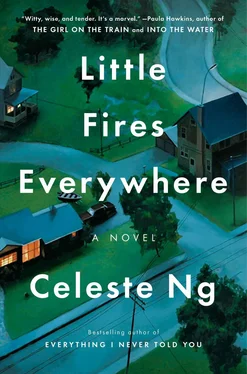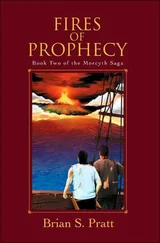But three generations of Shaker reverence for order and rules and decorum would stay with Elena, too, and she would never quite be able to bring those two ideas into balance. In 1968, at fifteen, she turned on the television and watched chaos flaring up across the country like brush fires. Martin Luther King, Jr., then Bobby Kennedy. Students in revolt at Columbia. Riots in Chicago, Memphis, Baltimore, D.C.—everywhere, everywhere, things were falling apart. Deep inside her a spark kindled, a spark that would flare in Izzy years later. Of course she understood why this was happening: they were fighting to right injustices. But part of her shuddered at the scenes on the television screen. Grainy scenes, but no less terrifying: grocery stores ablaze, smoke billowing from their rooftops, walls gnawed to studs by flame. The jagged edges of smashed windows like fangs in the night. Soldiers marching with rifles past drugstores and Laundromats. Jeeps blocking intersections under dead traffic lights. Did you have to burn down the old to make way for the new? The carpet at her feet was soft. The sofa beneath her was patterned with roses. Outside, a mourning dove cooed from the bird feeder and a Cadillac glided to a dignified stop at the corner. She wondered which was the real world.
The following spring, when antiwar protests broke out, she did not get in her car and drive to join them. She wrote impassioned letters to the editor; she signed petitions to end the draft. She stitched a peace sign onto her knapsack. She wove flowers into her hair.
It was not that she was afraid. It was simply that Shaker Heights, despite its idealism, was a pragmatic place, and she did not know how to be anything else. A lifetime of practical and comfortable considerations settled atop the spark inside her like a thick, heavy blanket. If she ran off to Washington to join the protests, where would she sleep? How would she stay safe? What would become of her classes, would she be expelled, could she still graduate and go to college? The spring of their senior year, Jamie Reynolds had pulled her aside after history class one day. “I’m dropping out,” he said. “Going to California. Come with me.” She had adored Jamie since the seventh grade, when he had admired a sonnet she’d written for English. Now, at almost eighteen, he had long hair and a shaggy beard, a dislike for authority, a VW van in which, he said, they could live. “Like camping out,” he’d said, “except we can go anywhere,” and she had wanted so badly to go with him, anywhere, to kiss that crooked, bashful smile. But how would they pay for food, where would they do their laundry, where would they bathe? What would her parents say? The neighbors, her teachers, her friends? She’d kissed Jamie on the cheek and cried when, at last, he was out of sight.
Months later, off at Denison, she sat with classmates and watched the draft lottery live on the grainy common-room television. Jamie’s birthday—March 7—had come up on the second pick. So he would be among the first to be called to fight, she thought, and she wondered where he had gone, if he knew what awaited him, if he would report, or if he would run. Beside her, Billy Richardson squeezed her hand. His birthday was one of the last drawn, and anyway, as an undergraduate, he had been granted a deferral. He was safe. By the time they graduated, the war would be over and they would marry, buy a house, settle down. She had no regrets, she told herself. She’d been crazy to have considered it even for a moment. What she had felt for Jamie back then had been just a tiny, passing flame.
All her life, she had learned that passion, like fire, was a dangerous thing. It so easily went out of control. It scaled walls and jumped over trenches. Sparks leapt like fleas and spread as rapidly; a breeze could carry embers for miles. Better to control that spark and pass it carefully from one generation to the next, like an Olympic torch. Or, perhaps, to tend it carefully like an eternal flame: a reminder of light and goodness that would never—could never—set anything ablaze. Carefully controlled. Domesticated. Happy in captivity. The key, she thought, was to avoid conflagration.
This philosophy had carried her through life and, she had always felt, had served her quite well. Of course she’d had to give up a few things here and there. But she had a beautiful house, a steady job, a loving husband, a brood of healthy and happy children; surely that was worth the trade. Rules existed for a reason: if you followed them, you would succeed; if you didn’t, you might burn the world to the ground.
And yet here was Mia, causing poor Linda such trauma, as if she hadn’t been through enough, as if Mia were any kind of example of how to mother. Dragging her fatherless child from place to place, scraping by on menial jobs, justifying it by insisting to herself—by insisting to everyone—she was making Art . Probing other people’s business with her grimy hands. Stirring up trouble. Heedlessly throwing sparks. Mrs. Richardson seethed, and deep inside her, the hot speck of fury that had been carefully banked within her burst into flame. Mia did whatever she wanted, Mrs. Richardson thought, and what would result? Heartbreak for her oldest friend. Chaos for everyone. You can’t just do what you want, she thought. Why should Mia get to, when no one else did?
It was only this loyalty to the McCulloughs, she would tell herself, the desire to see justice for her oldest friend, that led her to step over the line at last: as soon as she could get away, she would take a trip to Pennsylvania and visit Mia’s parents. She would find out, once and for all, who this woman was.
Those days, it seemed to Pearl that everything was saturated with sex; everywhere it oozed out, like dirty honey. Even the news was full of it. On The Today Show, a host discussed the rumors about the president and a stained blue dress; even more salacious stories circulated about a cigar and where it might have been placed. Schools across the country dispatched social workers to “help young people cope with what they’re hearing,” but in the hallways of Shaker Heights High School, the mood was hilarity rather than trauma. What’s the difference between Bill Clinton and a screwdriver? A screwdriver turns in screws, and . . . She wondered, sometimes, if the whole country had fallen into a Jerry Springer episode. What do you get when you cross Ted Kaczynski with Monica Lewinsky? A dynamite blowjob!
Between math and biology and English, people traded jokes as gleefully as children with baseball cards, and every day the jokes became more explicit. Did you hear about the Oval Office Cigars? They’re ribbed and lubricated. Or: Monica, whispering to her dry cleaner: Can you get this stain out for me? Dry cleaner: Come again? Monica: No, it’s mustard. Pearl blushed, but pretended she’d heard it before. Everyone seemed so blasé about saying words she’d never even dared to whisper. Everyone, it seemed, was fluent in innuendo. It confirmed what she’d always thought: everyone knew more about sex than it appeared, everyone except her.
It was in this mood that Pearl, in mid-February, found herself walking to the Richardson house alone. Izzy would be at Mia’s, poring over a contact sheet, trimming prints, absorbing Mia’s attention, making space for Pearl to be elsewhere. Moody had failed a pop quiz on Jane Eyre and had stayed after to retake it. Mr. and Mrs. Richardson were at work. And Lexie, of course, was otherwise occupied. When Pearl had passed her at her locker, Lexie had said, “See you later, Brian and I are—hanging out,” and in Pearl’s mind all the nebulous things that were swirling in the air rushed in to fill that pause. She was still thinking about it when she got to the Richardsons’ and found only Trip at home, stretched out across the couch in the sunroom, long and lean, math book spread on the cushion beside him. He had kicked off his tennis shoes but still had on his white tube socks, and she found this oddly endearing.
Читать дальше












